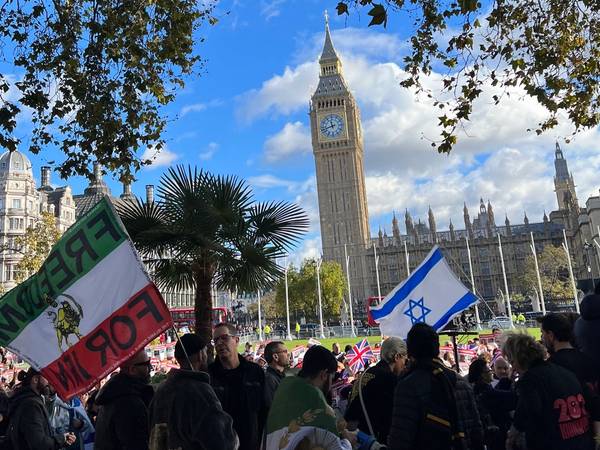Amid a wave of pro-Palestinian rallies across the world, hardliners in Iran are admitting that the general public there have little appetite for the Palestinian cause.
Iran has seen no grassroot, popular expression of solidarity with Palestinians, except by groups supported by and loyal to the regime, since Israel began its onslaught on Gaza in retaliation for Hamas’ attack of October 7.
This is despite the fact that the Islamic Republic of Iran is the main supporter of Hamas –or perhaps because of it.
Nasser Imani, a conservative journalist and a staunch supporter of Supreme Leader Ali Khamenei, acknowledged in an interview Sunday that many ordinary Iranians “stand against whatever the Islamic Republic favors, and support whatever the Islamic Republic opposes.”
“Of course, when you have the overseas TV channels in your home all day, airing news that is biased in favor of the US and Israel, you can’t expect anything but this,” Imani said. He was referring to Persian-language broadcasters based abroad, such as Iran International, Manoto TV based in London, the Voice of America and BBC in Persian.
The Iranian regime has been on full-propaganda mode since the October 7 attack on Israel, praising Hamas and trashing Israel. Still, there’s been no outpouring of emotions for Palestinians, nor an authentic movement of solidarity in Iran.
But that’s not all. Many Iranians on social media have come out to back Israel, and some groups of Iranians outside Iran, have not only not marched in support of Palestinians, but taken risks showing up at pro-Hamas protests with pro-Israeli banners.
In London, for instance, a group of Iranians joined the rally in support of Israel, waving flags of pre-Revolutionary Iran. One Iranian activist took to the stage to offer her perspective to the crowd.
“The Islamic Republic, the supporter, trainer and the biggest funder of terrorism in the Middle East is holding my entire nation hostage,” said Leili Bazargan, an Iranian producer and activist.
“The people of Iran are on your side,” she claimed, referring to the crowd waving Israeli flags.
Similar instances have been reported in the past few days in the US, in Belgium, in Canada, and in Germany –where Iranians joined the front row of the marching crowd, holding the famous Lion and Sun flag of Iran pre-1979 and a picture of Reza Pahlavi, the heir to the last Shah of Iran.
There’s no real, open discussion in Iran about Israel and Palestine. The regime propagates its anti-Israeli policy with little subtlety.
Israel (or the “Usurper Zionist Regime” as the Islamic Republic officials call it) is a red line. No opposing view is tolerated, not even slight disagreements. It is hard, therefore, to gauge the public opinion on the ongoing war in Gaza. But Imani’s observation seems to be a rough guide of where many Iranians stand on the issue.
“No Gaza, No Lebanon, I shall die for Iran,” has been a recurring slogan in many protests in Iran for at least a decade. Many Iranians seem to resent the fact that their government spends money in Iraq, Syria, Lebanon or Palestine, while they’re suffering with an ailing economy.
This sentiment is by no means universal, of course.
Last week, Narges Mohammadi, who won the 2023 Nobel Peace Prize, issued a statement from prison, calling for a humanitarian ceasefire. However, some on social media criticized her for indirectly supporting the position of the regime. Israel and its supporters say that a ceasefire now would simply allow Hamas to regroup and continue to pose a threat.
“Attacks on innocent people, hostage taking, killing of women, children and non-combatants, targeting of hospitals, missile strikes on residential areas, have left the world in astonishment, horror and despair,” her statement read.
“With the power of global public opinion and the international unity of human rights defenders and peacemakers, though difficult, we can walk the path of peace, equality and freedom.”
